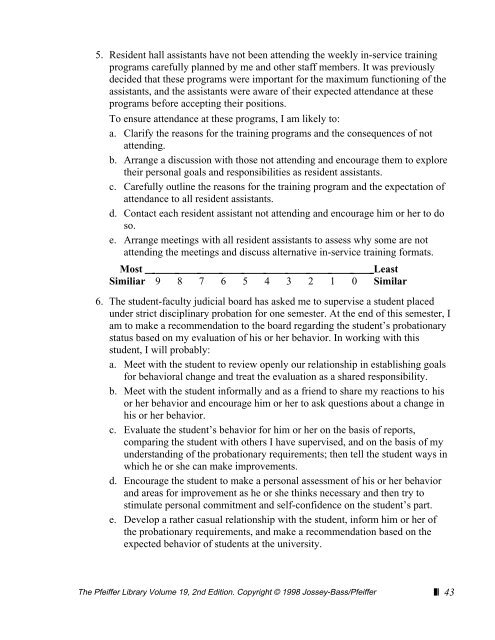motivational analysis of organizations
motivational analysis of organizations
motivational analysis of organizations
Create successful ePaper yourself
Turn your PDF publications into a flip-book with our unique Google optimized e-Paper software.
5. Resident hall assistants have not been attending the weekly in-service training<br />
programs carefully planned by me and other staff members. It was previously<br />
decided that these programs were important for the maximum functioning <strong>of</strong> the<br />
assistants, and the assistants were aware <strong>of</strong> their expected attendance at these<br />
programs before accepting their positions.<br />
To ensure attendance at these programs, I am likely to:<br />
a. Clarify the reasons for the training programs and the consequences <strong>of</strong> not<br />
attending.<br />
b. Arrange a discussion with those not attending and encourage them to explore<br />
their personal goals and responsibilities as resident assistants.<br />
c. Carefully outline the reasons for the training program and the expectation <strong>of</strong><br />
attendance to all resident assistants.<br />
d. Contact each resident assistant not attending and encourage him or her to do<br />
so.<br />
e. Arrange meetings with all resident assistants to assess why some are not<br />
attending the meetings and discuss alternative in-service training formats.<br />
Most Least<br />
Similiar 9 8 7 6 5 4 3 2 1 0 Similar<br />
6. The student-faculty judicial board has asked me to supervise a student placed<br />
under strict disciplinary probation for one semester. At the end <strong>of</strong> this semester, I<br />
am to make a recommendation to the board regarding the student’s probationary<br />
status based on my evaluation <strong>of</strong> his or her behavior. In working with this<br />
student, I will probably:<br />
a. Meet with the student to review openly our relationship in establishing goals<br />
for behavioral change and treat the evaluation as a shared responsibility.<br />
b. Meet with the student informally and as a friend to share my reactions to his<br />
or her behavior and encourage him or her to ask questions about a change in<br />
his or her behavior.<br />
c. Evaluate the student’s behavior for him or her on the basis <strong>of</strong> reports,<br />
comparing the student with others I have supervised, and on the basis <strong>of</strong> my<br />
understanding <strong>of</strong> the probationary requirements; then tell the student ways in<br />
which he or she can make improvements.<br />
d. Encourage the student to make a personal assessment <strong>of</strong> his or her behavior<br />
and areas for improvement as he or she thinks necessary and then try to<br />
stimulate personal commitment and self-confidence on the student’s part.<br />
e. Develop a rather casual relationship with the student, inform him or her <strong>of</strong><br />
the probationary requirements, and make a recommendation based on the<br />
expected behavior <strong>of</strong> students at the university.<br />
The Pfeiffer Library Volume 19, 2nd Edition. Copyright © 1998 Jossey-Bass/Pfeiffer ❚❘ 43

















